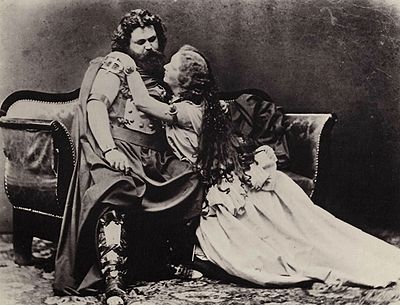
As a follow-up to Mahlerman’s wonderful Lazy Sunday post on Wagner, we thought Worm’s piece from August 2010 would be a suitable episode in our season of holiday repeats…
It is fortunate for us mere mortals that the sexual escapades that consume and torment the greatest artistic geniuses often produce such an enjoyable legacy of great works, and so it is the case with Richard Wagner; a lusty chap whose angst-furrowed brow concealed a pair of eyes constantly on the search for female examples of the German aesthetic. Whilst married to his wife Minna, Wagner fell for Mathilde, the young bride of a silk merchant friend. At about the same time, he also became heavily enamoured with the philosophy of Schopenhauer. Casting aside his drudgy work on the Ring Cycle, from 1857 Wagner poured his love-sick energy into creating the masterpiece that is Tristan und Isolde. The work, centering on a tale of doomed passion, was his way of artistically consumating his all-engulfing infatuation with Mathilde. Seeking to embody Schopenhauer’s aesthetic by using music to represent the will – (According to Daniel Albright, “Schopenhauer thought that music was the only art that did not merely copy ideas, but actually embodied the will itself.”) – Wagner cast the forbidden bond between himself and Mathilde as being one of pre-destined downfall; writing of his preoccupations with Schopenhauer and Tristan in a letter to his friend Franz Liszt:
Never in my life having enjoyed the true happiness of love I shall erect a memorial to this loveliest of all dreams in which, from the first to the last, love shall, for once, find utter repletion. I have devised in my mind a Tristan und Isolde, the simplest, yet most full-blooded musical conception imaginable, and with the ‘black flag’ that waves at the end I shall cover myself over – to die.
Two years later, the long-suffering Minna intercepted a love letter, and the laison was terminated. The opera was not to be completed or performed for another 7 years. During this time Wagner moved to Munich, and it was here that Ludwig II gave him the backing to stage Tristan for the first time.
The story is partly set on a ship bound for Cornwall. The aria, containing the new innovation of harmonic suspension, has a building swelling climax that urges you towards the carthartic ending. Love as transfiguration. Liebestodt means ‘the love-death’, a literal swansong.
This performance of the aria, by the impossibly german-sounding Waltraud Meier is probably my favourite so far, her voice is wonderfully sweet and warm, and she manages to convey the essence of the emotion in the words, making you believe that in the final outpouring of the energy of her soul, the power of Isolde’s love can transcend the bonds of this mortal earth. An approximate translation of the last words reads:
Shall I breathe,
Shall I listen?
Shall I drink,
immerse?
Sweetly in fragrances
melt away?
In the billowing torrent,
in the resonating sound,
in the vast wave of the world’s-breath
drown,
be engulfed
unconscious
supreme bliss!











Reading your piece again Worm I found, through the wonders of the web (wwww) that the big lad above in your picture, obviously a man in his late forties, was but a callow youth of 29 rejoicing in the wonderful name of Ludwig Schnorr von Carolsfeld. And the adoringly sluttish woman at his feet ( ah, memories, memories ) is Frau Carolsfeld, one Malvina. They had cosied-up to Dicky and got the gig to premier T&I in June 1865. Five weeks later Ludwig, having died just three times on stage as Tristan, passed into history himself, with Malvina in her grief immediately giving up singing, but failing to quite mirror her role as Isolde, living on for almost four decades – as women tend to.
The ‘music drama’, one of the longest and most challenging for all performers, was blamed for Ludwig’s demise, but it also finished two conductors of world renown Felix Mottl and Joseph Keilberth, both conking-out in the long second act. The curse of Wagner?
fascinating MM – there did seem to be a lot of tragic dying and convoluted eurotrash wife swapping going on around Wagner and his cronies. Perhaps thats a perfectly normal state of affairs for germans
Or just the human condition.
Got himself into a bit of a lather no doubt, there being no porn encrusted internet in those days Richard had to settle for the real thing, in the flesh so to speak.
He was on a far more stable platform with the Norns and stuff, the Yvette Coopers of the day. Poor old Siegfried of course for ever being fussed over by Brünnhilde had a bit of a miserable time up there at Drachenfels, couldn’t even pop up to the Löwenburger Hof for a slice of apple cake and gargle some apple wine. As we know the whole legend thing originates up in the icy north and has been borrowed for a while, allegedly, as Siggie supposedly hailes from Xanten. Nice town near the Dutch Border, overflow accommodation in the hotels when the Düsseldorf K Messe is in full flow even though a ninety minute drive away.
Do we think that RW was visiting the K Messe, the worlds largest plastics exhibition, couldn’t find a hotel in Düsseldorf and, staying in Xanten and while out for a walk and a spot of hookering discovered Siggie’s house.
Ergo, the Ring is born.
Drachenfels is located in the Siebengebirge, the seven hills, can be seen from Köln’s Mediapark tower some 25 miles away. Low wooded hills excellent for winterreise on a cold clear December day, park near Bad Honef, kick the beech leaves and imagine Dietrich Fischer-Dieskau’s words ringing through the trees. Up to the Loewenburger-hof for a swift half and some cake, nice.
Bad Honef, the resting place of Konrad Adenauer and Gen Hans Speidel, I digress.